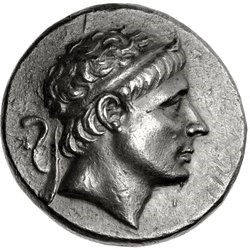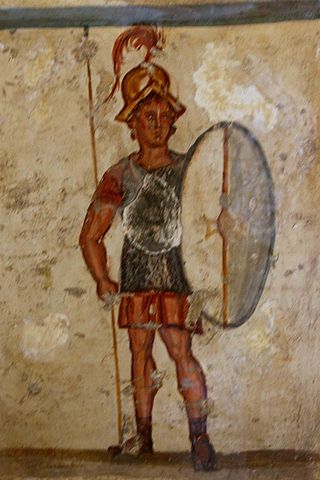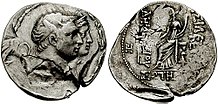
The 2nd century BC started the first day of 200 BC and ended the last day of 101 BC. It is considered part of the Classical era, although depending on the region being studied, other terms may be more suitable. It is also considered to be the end of the Axial Age. In the context of the Eastern Mediterranean, it is the mid-point of the Hellenistic period.
This article concerns the period 159 BC – 150 BC.
This article concerns the period 169 BC – 160 BC.
This article concerns the period 179 BC – 170 BC.

Demetrius I, surnamed Soter, reigned as king (basileus) of the Hellenistic Seleucid Empire from November 162 to June 150 BC. Demetrius grew up in Rome as a hostage, but returned to Greek Syria and overthrew his young cousin Antiochus V Eupator and regent Lysias. Demetrius took control during a turbulent time of the Empire, and spent much of his time fighting off revolts and challenges to his power from threats such as Timarchus and Alexander Balas.

Antiochus II Theos was a Greek king of the Hellenistic Seleucid Empire who reigned from 261 to 246 BC. He succeeded his father Antiochus I Soter in the winter of 262–61 BC. He was the younger son of Antiochus I and princess Stratonice, the daughter of Demetrius Poliorcetes.

Antiochus III the Great was a Greek Hellenistic king and the 6th ruler of the Seleucid Empire, reigning from 223 to 187 BC. He ruled over the region of Syria and large parts of the rest of western Asia towards the end of the 3rd century BC. Rising to the throne at the age of eighteen in April/June 223 BC, his early campaigns against the Ptolemaic Kingdom were unsuccessful, but in the following years Antiochus gained several military victories and substantially expanded the empire's territory. His traditional designation, the Great, reflects an epithet he assumed. He also assumed the title Basileus Megas, the traditional title of the Persian kings. A militarily active ruler, Antiochus restored much of the territory of the Seleucid Empire, before suffering a serious setback, towards the end of his reign, in his war against Rome.

Perseus was king of the ancient kingdom of Macedon from 179 until 168 BC. He is widely regarded as the last king of Macedonia and the last ruler from the Antigonid Dynasty, as his defeat by Rome at the Battle of Pydna during the Third Macedonian War effectively ended Macedonia as an independent political entity.

Antigonus III Doson was king of Macedon from 229 BC to 221 BC. He was a member of the Antigonid dynasty. He was called Euergetes, Soter and Guardian (ἐπίτροπος) as he was the guardian of Philip V of Macedon.

Eumenes II Soter was a ruler of Pergamon, and a son of Attalus I Soter and queen Apollonis and a member of the Attalid dynasty of Pergamon.

Pharnaces I, fifth king of Pontus, was of Persian and Greek ancestry. He was the son of King Mithridates III of Pontus and his wife Laodice, whom he succeeded on the throne. Pharnaces had two siblings: a brother called Mithridates IV of Pontus and a sister called Laodice who both succeeded Pharnaces. He was born and raised in the Kingdom of Pontus.

Ariarathes V Eusebes Philopator was a son of the preceding king Ariarathes IV of Cappadocia and queen Antiochis. He was distinguished by his contemporaries for his excellence of his character and his cultivation of philosophy and the liberal arts and is considered by some historians to have been the greatest of the kings of Cappadocia.

Ariarathes IV, surnamed Eusebes, "the Pious",, was the king of Cappadocia in 220–163 BC.

The Antigonid Macedonian army was the army that evolved from the ancient Greek kingdom of Macedonia in the period when it was ruled by the Antigonid dynasty from 276 BC to 168 BC. It was seen as one of the principal Hellenistic fighting forces until its ultimate defeat at Roman hands at the Battle of Pydna in 168 BC. However, there was a brief resurgence in 150-148 during the revolt of Andriscus, a supposed heir to Perseus.
Stratonice was a princess of the Seleucid Empire. She was one of the daughters born to the Seleucid Monarchs Antiochus II Theos and Laodice I. Among her brothers was the Seleucid King Seleucus II Callinicus and prince Antiochus Hierax.
Stratonice was a princess of Cappadocia and through marriage a queen of Pergamon.
Laodice IV was a Greek princess, head priestess and a queen of the Seleucid Empire. Antiochus III appointed Laodice in 193 BC, as the chief priestess of the state cult dedicated to her mother Laodice III in Media. She later was married to three kings of the Seleucid Empire --all her brothers.
Nysa or Nyssa was a Greek Seleucid princess and a queen of the Kingdom of Pontus.
Laodice VI was a Greek Seleucid princess and through marriage was a queen of the Kingdom of Pontus.











